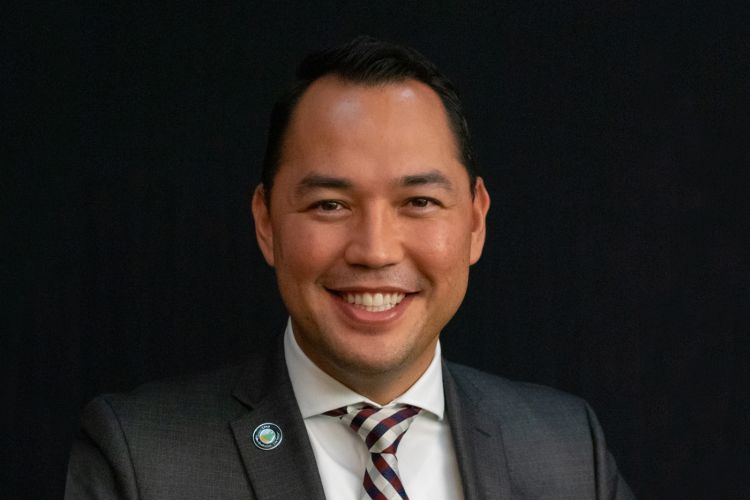Breadcrumb
Pharmacy leader Michael Conner offers networking tips

Standout pharmacist and industry leader Michael Conner ’12, PharmD, Global MBA is using his position as president-elect of the California Pharmacists Association (CPhA) to advocate for the pharmacy profession. Dr. Conner is the regional pharmacy services manager for the Fresno Regional Office of California Correctional Health Care Services and owner and coach for Conner Consulting.
He and his wife, Jennifer Conner ’13, PharmD, who works at the Valley Children’s Home Infusion in Fresno, are raising their family in the Central Valley.
Dr. Conner has built a wide, effective network including faculty, students, Pacific alumni, industry leaders and other pharmacists. He notes that CPhA’s upcoming Western Pharmacy Exchange, April 28-30 in Las Vegas, provides pharmacists with a wealth of networking opportunities. And because the event is open to California pharmacists and industry professionals from Hawaii, Nevada, New Mexico, Colorado and Utah, 700 to 800 participants are expected.
Dr. Conner will be formally inducted as CPhA president at Western Pharmacy Exchange on April 29.
Tried-and-true networking tips for both students and seasoned professionals
Q. What is your advice for those who find networking intimidating?
Dr. Conner: Asking an experienced friend, colleague or mentor to introduce you to a few people initially is a good way to get your feet wet.
Second, come in with the right mindset. Often your thoughts of shyness or insecurity will color your interactions. Instead, come in wanting to make solid connections. With that mindset you can start meeting and clicking with people. Look beyond the profession – it’s guaranteed that whatever your interest is, whether it’s gaming, intramural sports or pickleball, you’ll find another pharmacist who shares that interest.
Third, the setting of a conference room or cocktail party can be intimidating, it requires energy. Realizing people are willing to open up and introduce you to others is helpful.
Lastly, strong body language and good posture, standing up tall, increases serotonin and makes you appear confident.
Once you meet a few people, you realize you can network.
“Look beyond the profession – it’s guaranteed that whatever your interest is, whether it’s gaming, intramural sports or pickleball, you’ll find another pharmacist who shares that interest.”

Michael Conner ’12, PharmD, Global MBA (center) with his mentors, Donald G. Floriddia ’71, PhD (left) and Ralph L. Saroyan ’64, RPh (right)
Q. How can you use conferences and other professional events to build your network?
Dr. Conner: Before I walk into conference events I remind myself why I am there. I try to convert my nervousness into excitement – enthusiasm for meeting new people and learning new things. Once past the initial icebreaking phase, asking good questions and listening well to others are the keys to successful relationship-building.
Go into the conference knowing you want to learn more. You may have some questions in mind, but don’t limit spontaneity — you’ll have the chance to make connections you didn’t anticipate.
Once home, make the time to join and become active in professional organizations. Attend events locally and regionally and maintain occasional contact with your newfound colleagues.
“People like being asked for their professional advice. While you might be nervous calling someone for the first time, remind them where you met and ask for their advice on their area of expertise.”
Q. What are effective ways to nurture relationships with new contacts after the conference ends?
Dr. Conner: I like to send a follow-up email to the folks I’ve met.
Facebook and LinkedIn provide ready ways to maintain contact with hundreds of people. If your purpose statement and background are succinct and well-written, it will help contacts learn more about you.
Q. Why is it important to get involved?
Dr. Conner: The pharmacy profession will only truly transform if we can unify and [successfully pass new legislation]. My vision as incoming president is for strong governance and leadership, so our members will have an effective voice.
With engaged and active members, our organization offers a host of leadership and mentoring opportunities across the state, as well as continuing education credits. Just as our Pacific degrees open many doors and provide diverse contacts, CPhA offers opportunities to work together toward common goals professionally, educationally and politically. One example is Advocacy Day, planned for March 8, in Sacramento.
Q. Why should you give back to the profession?
Dr. Conner: As pharmacists, we take an oath to advocate for public health and our patients above all. Our patients need a voice, and we have a unique opportunity – we are in every town, including in rural communities – where we are best situated to advocate for them.
Surveys show that more than 80 percent of people found their jobs through personal connections. When you are engaged and giving back, you have a sense of autonomy and ownership in what you do; that’s the key to being happy as a pharmacist.





